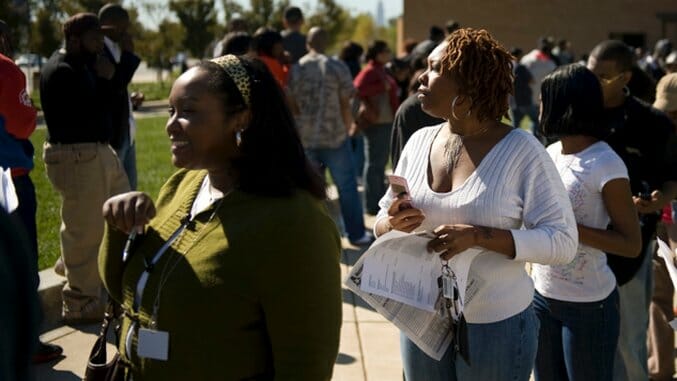North Carolina is the Ugly Poster Child for Suppression of the Black Vote
Photo by Davis Turner/Getty
This year’s beyond-contentious election has featured a great deal of discussion about race, disenfranchisement of all stripes, and, of late, “rigged” election results. Proof of these rigged results does actually exist—although not in the form Donald Trump and his cronies are so fond of imagining. In North Carolina—where all a person needs to challenge the validity of another’s vote is a single piece of returned mail (yes, really)—it is abundantly clear that recent changes in voting laws have made voting early not only untenable for many African Americans in the Tar Heel State, but downright disallowed by law.
After a three year legal battle fought by the likes of the NAACP, these changes in law were not just overturned by the Fourth Circuit of Appeals; they were labeled as what they truly were—racially motivated attempts to alter the voting landscape. Despite this adamant rebuke of a pathetically transparent attempt to disenfranchise the black vote, early voter turnout among African American voters in North Carolina has dropped significantly this year, and the state stands as perhaps the most important of the swing states on election day.
When the Fourth Circuit Court of Appeals struck down North Carolina’s reprehensible law HB 589 in July, the court tellingly saw fit to point out the racist aims of the Republican-enacted law, saying that the state’s general assembly had, “requested data on the use, by race, of a number of voting practices… Upon the receipt of the race data, the General Assembly enacted legislation that restricted voting and registration in five different ways, all of which disproportionately affected African Americans.”
The court repealed five sections of the law: a rollback of early voting days, an elimination of same-day registration and preregistration for teenagers, its ban on casting votes in the wrong precinct, and its voter ID requirements. For examples of how this rules were racially motived, one needn’t look very hard. The ACLU estimates that a quarter of black Americans lack a government-issued photo ID, compared to just 8% of whites, and the court mentioned that a rollback of early voting days took away one of two “souls-to-the-polls” Sundays, events where churches provide rides to polling places.
48% of North Carolina’s early voters were registered Democrats in 2012, as opposed to 32% of registered Republicans, a difference of 140,000 votes for the Democrats. Although early voting is up overall this year in the state, black voters are turning out at an 82% clip compared to 2012. The NC GOP cheered this revelation in a press release today with all the self-satisfaction of someone experiencing the joy of seeing a plan play out as you’d hoped.
This @NCGOP press release on early voting statistics highlights decrease in African-Americans voting. #ncpolpic.twitter.com/wzlegECMVX